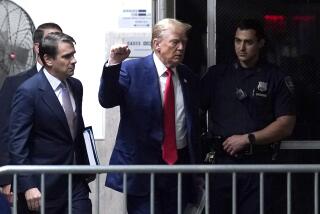Cheney scheduled to testify at Libby’s trial
- Share via
WASHINGTON — Dick Cheney will be called to testify at the perjury and obstruction trial of his former chief of staff, in what would be a historic appearance by a vice president in a criminal prosecution, lawyers said Tuesday.
The decision by I. Lewis “Scooter” Libby’s lawyers to call Cheney as a witness in the federal trial scheduled to begin here Jan. 16 ends months of speculation about the role senior White House officials would play.
It also sets the stage for a dramatic appearance that could offer insight into Cheney’s relationship with his top aide, and for a cross-examination by special prosecutor Patrick J. Fitzgerald that could lay bare how the Bush administration responded to its critics.
Libby resigned after being indicted in October 2005 on charges that he lied to a grand jury about his conversations with reporters about CIA operative Valerie Plame. White House critics have said that the leak was part of a campaign to undermine her husband, former envoy Joseph C. Wilson IV, who had accused the administration in a newspaper opinion piece of misleading the public on the case for war in Iraq.
Libby has denied the charges, saying that any misstatements were inadvertent and reflected his focus on weightier matters of state, such as terrorism and the war in Iraq.
Libby’s lawyers hope that Cheney, as his former boss, will be able to buttress that claim by citing their close working relationship.
The lawyers did not say whether they expected Cheney would appear in court or give his testimony in a deposition, although their statements indicated that they believe the vice president would appear in person and voluntarily without a subpoena.
“We don’t believe he is going to resist,” attorney Bill Jeffress said.
Lea Anne McBride, the vice president’s press secretary, said Cheney would testify, if called. “We’ve cooperated fully in this matter and will continue to do so.” She declined to comment further.
The decision to call Cheney was revealed at a hearing Tuesday in federal court as U.S. District Judge Reggie B. Walton worked through proposed instructions for screening potential jurors.
Fitzgerald, who had once indicated he might subpoena Cheney, told Walton that he did not intend to call the vice president after all.
“We’re calling the vice president,” Theodore V. Wells Jr. responded, without elaboration.
That apparently would be a historic event.
In 1988, Vice President George H.W. Bush testified to investigators in the Iran-Contra arms-for-hostages probe, but his testimony was never used.
By contrast, a number of presidents have participated in trials over the years, often by videotape.
President Clinton gave videotaped testimony in a criminal trial involving two former business partners in the Whitewater land deal.
President Ford gave a videotaped deposition in the trial of Lynette “Squeaky” Fromme, who was convicted of trying to assassinate him.
And President Carter provided videotaped testimony in a grand jury investigation of financier Robert Vesco.
Cheney and Libby got to know each other when Cheney was Defense secretary under the first President Bush.
When George W. Bush was elected in 2000, Cheney asked Libby to be one of his top aides. And after the Sept. 11 attacks, the two men were among the administration’s leading proponents that the U.S. response should include a confrontation with Iraq.
It was in the debate over the decision to go to war that Plame’s identity became public. Critics contend it was leaked in retaliation for Wilson’s criticism.
Wilson took a trip to Niger for the CIA in 2002 to assess a report that the African nation was selling nuclear materials to Iraq. Bush cited the accusation in his 2003 State of the Union address. Wilson asserted in his column that he had found the claim to be baseless.
Syndicated columnist Robert Novak first named Plame as a CIA employee, suggesting Wilson’s trip was the result of nepotism.
The trial is expected to feature the testimony of several journalists who spoke with Libby about Plame. Jeffress said Tuesday that two reporters were resisting testifying, but he did not identify them.
Walton delayed ruling on whether he would allow the government to use two pieces of evidence that could prove damaging to the defense.
One was a letter Libby wrote to Judith Miller, then a New York Times reporter who had been jailed for contempt. She had refused to speak with Fitzgerald about conversations she had with Libby.
In the letter, Libby suggested that Miller would back up his story that he had not leaked Plame’s CIA identity. Fitzgerald said the letter could be viewed as an invitation to skew her testimony.
Miller ultimately testified that Libby had mentioned Plame to her.
Jeffress also revealed that the government had obtained evidence that Libby was at a function with former CIA director George Tenet at which he learned Plame’s identity might be classified information.
Walton said that depending on when the conversation took place, the government might be able to use the information to show that Libby had a motive to lie about what he had told reporters.
*
More to Read
Get the L.A. Times Politics newsletter
Deeply reported insights into legislation, politics and policy from Sacramento, Washington and beyond. In your inbox twice per week.
You may occasionally receive promotional content from the Los Angeles Times.







